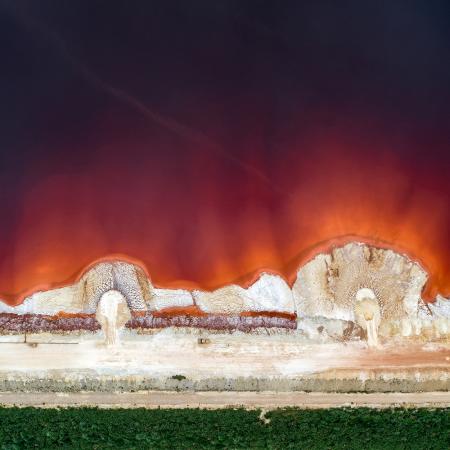"The Situation" II - Bengaluru
The most unlikely heroes have emerged.
Usha K R has published five novels, the latest titled Boys from Good Families. Her books have been listed for several national and international awards. A Girl and a River won India's Vodafone Crossword award. https://ushakr.wordpress.com/
It’s going to be a three-legged race …
As writers, we are advised to touch irony with a light hand, deal it out in small doses, but Nature is no such pussyfooter. The virus brazenly wears its crown of knobby tiaras – the thing has a name and a structure – we no longer tilt at windmills. (We also learnt recently that a flower with a startling likeness to the virus blooms in the tribal district of Bastar in central India. It belongs to the Melastoma family and is rich in medicinal properties; apparently, the locals chew on its twigs and use them as toothbrushes.)
The whole world (almost) has been in stages of lockdown and it’s getting on to two months now. It could extend indefinitely, in some form, even when the locks are opened. When our country of 1.30 billion locked down, we marvelled at our own administrative feat. Everything came to a grinding halt as we all stayed home. We were disoriented for the first few days. We mourned the empty city streets, our disrupted routines, the enforced leisure; till then confinement was a word more associated with childbirth. As recompense we had newspapers and books; there was TV and WhatsApp and Netflix.
The self-same newspapers and television brought us visions of migrant workers, many of whom had started walking back hundreds of kilometres to return to their villages. (If Wikipedia is to be believed, almost 140 million workers migrate from the villages to the cities in search of work.) What of them? Or the daily-wage earners or families confined to single sheds with asbestos roofs? “Stay home” seems a taunt then, and “social distancing” an Austenian literary conceit.
A newspaper interviewed several such migrant workers who had not gone home but were housed in shelters, surviving on subsistence rations. What they looked forward to most was the food they would have once they reached home. Their wants were simple. Parwal (pointed gourd) should be in season now, a young man mused. I will ask my wife to make me a potato-parwal curry when I reach home.
When this is over and we begin anew, perhaps we will be reminded of the dignity that each human being is entitled to, and work towards a more equitable world.
The most unlikely heroes have emerged. The word “Asha” in Hindi means “hope”; it is also an acronym for the clunkily bureaucratic Accredited Social Health Activist. The ASHA workers, women of modest means, carry on their shoulders the enormous responsibility of mobilising their local communities to be responsive to modern medicine and the health care system. They have been tireless in the present pandemic, going into crowded neighbourhoods to check on health parameters, giving out information, coaxing people into self-quarantine, often at the risk of their own safety. Like the ASHA women there are several groups of people, cogs in the system’s wheels – sanitation workers, delivery boys and others—who have been quietly doing their jobs.
The writing is on the wall. We will have to review what we value, and understand that our individual health and well-being are tied up with those of others, of the larger community. Going forward, it is going to be a three-legged race whether we like it or not.
The Earth has been given some breathing space, some downtime. There are reports of peacocks wandering on the streets of Mumbai and dolphins swimming off its coast. Incredulous citizens from north Indian towns post photographs of the Himalayan ranges which they can see from their rooftops for the first time in their lives, as the air has cleared up.
We can only repeat Mahatma Gandhi’s succinct if bald statement --There is enough on Earth for everybody's need, but not enough for everybody's greed. We will have to learn to school our appetites and marshal our resources better.
But human memory is short. We have survived wars, pestilences, disasters both man-made and natural. Each time we have been given an opportunity to begin again. This time, we must take the baton and run with it.
Spring 2020
Vol 10 No 3
"The Situation" - II
- Editorial
- Alice Yousef (Jerusalem)
- Minae Mizumura (Tokyo)
- Chandrahas Choudhury (New Delhi)
- Peter Kimani (Nairobi)
- Jacqueline Goldberg (Caracas)
- Andrea Hirata (Sumatra)
- Mabrouck Rachedi (Paris)
- Kavery Nambisan (Kodava)
- Ameena Hussein (Colombo)
- Helon Habila (Fairfax, VA)
- Amira Gehanne Khalfallah (Istanbul/Algiers)
- Marjan Strojan (Ljubljana)
- Med Magani (Algiers)
- Beaudelaine Pierre (Minneapolis/Port-au-Prince)
- Mohib Zegham (Kabul)
- Usha K R (Bengaluru)
- Nick Yu (Shanghai)
- Ksenia Dragunskaya (rural Russia)
- Haifa Abu-Al Nadi (Amman)
- Nikola Madzirov (Strumica)
- Soheil Najm (Baghdad)
- Antoinette Tidjani Alou (Paris/Niamey)
- Sabata-Mpho Mokae (Kimberley)
- Khaled Khalifa (Latakia)



